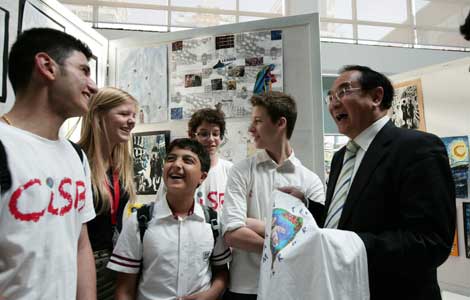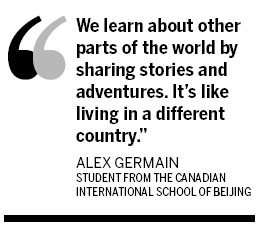Society
The world in a school
Updated: 2011-06-21 07:59
By Liu Xiangrui (China Daily)
|
 Francis Pang, chairman of CISB, with students at the annual student-led fundraiser in the school's lobby. Lu Zhongqiu / China Daily |
The Canadian International School is home to more than 1,000 students from 56 countries and regions around the world, offering youngsters an unparalleled cross-cultural experience. Liu Xiangrui reports.
"Right here is a small planet Earth, with 50 miniature flags all over it, each drawn by a student from that country," Israeli Ben Danilov, 14, says of the T-shirts he is selling at the annual student-led fundraiser with other volunteers in the school's lobby. Danilov, who came to China six years ago with his businessman father, is quite fluent in Chinese and is one of more than 1,000 international students from 56 countries and regions at the Canadian International School of Beijing (CISB).
With a growing number of international schools and kindergartens, expat children in Beijing now face a greater choice in education systems as well as more opportunities after graduation. Most of them say studying in such a multi-cultural environment is often a memorable and beneficial experience.
"We definitely have more choices than we did five or six years ago, when there were few international schools and attending a local school was not a realistic option," says company executive Keith Moey from Malaysia, who has been in China for nine years.
Moey registered his daughter, now in Grade 7, in an American international school in Shanghai before he arrived in Beijing two years ago and chose the Canadian school, which, he says, appeared "more like a school", as it stops parents from entering the classrooms when classes are on.
Established five years ago and offering the International Baccalaureate (IB) program from kindergarten to Grade 12, CISB is one of the largest international schools in the city's downtown area, with 75 percent of its teachers from Canada.
"Beijing is getting more international, and it's just like studying and living in Canada here," the school's chairman Francis Pang says.
Danilov, who transferred to CISB a year ago from another international school in the city, says besides providing an English-speaking environment, the biggest plus of the school is that it offers the IB program.
"If we do well, we have a shot at universities all over the world," he says. The program also allows international students to change school, which they often do, without any disruption to their studies.
To celebrate multiculturalism, CISB students do profiles of different countries and the school also invites parents to share their culture through such activities as traditional food and costume festivals. The school canteens, too, offer a broad range of foods to cater to all of its students.
"We want our children to respect each other's cultures in this small global village," Pang says.
Alex Germain, who has been at CISB for two years, after his father moved from Canada to work as a journalist in Beijing, enjoys having a lot of friends from diverse countries.

"We learn about other parts of the world by sharing stories and adventures. It's like living in a different country," says the 14-year-old, who loves hearing stories of jungle gyms and rock-climbing from one of his Indonesian friends.
In school, Germain is part of the drama and movie clubs, and also plays basketball, soccer, and hockey for fun. In his free time he usually hangs around with friends, plays video games or chats online. "Just like any teenager," he says.
However, studying abroad is not all smooth sailing. "Actually, when I first moved to China, it was a bit weird for me," says Germain, who says Beijing's pollution and traffic is what he hates most.
Language poses another problem, as he can speak only a couple of Chinese words. When he first tried to get a taxi home, the taxi drivers had no idea where he wanted to go and he had to take five different taxis before he got the tones right.
Germain is the only pupil from North America in his circle of friends, and gets upset when he feels like connecting with people from home.
"But life is basically pretty easy for me, so I can't really complain," says the teenager, who will move back to Canada next year.
"I love China very much now and I'm sure I will come back."
Five years at an international school in Beijing has played a critical role in the personal growth of 17-year-old South Korean Cailyn Kim, who will graduate on Tuesday and has already been accepted by the prestigious Emily Carr University of Art and Design in Vancouver.
Before coming to Beijing to join her brother who was studying in college here, Kim was a shy girl and worried greatly about her not-so-perfect English.
While the first few months were hard, she soon made friends with people from different cultures, and this in turn helped her learn English much faster.
Her brother left for Vancouver for his graduate studies last year. "All of a sudden I was living a different life, and my friends envied me because I didn't have parents telling me 'do your homework, and clean your room'," she says. "But then I had to take care of everything."
"I had to talk to people, or else no one would help me, and I learned Chinese because of that," she laughs, saying she is more responsible and independent now.
Kim believes she has learned many useful lessons here, including cross-cultural communication.
"I was exposed to not just different languages but also religious sensitivities," she says, calling the time she cooked pork for her Muslim friend. "She said 'I like everything', so I went ahead and cooked (pork) for her. But then she was very mad and now I am very careful about this."
An active member of the school's drama club, Kim concentrated on her university applications this past year. She worries about college life in Canada.
"Canada is a totally different world, but my experience here will surely be helpful."
Universities in the West or back in their own countries aren't the only choices for international school students and their parents.
Keith Moey, who plans to stay in China, prefers that his children go to Chinese universities, despite the possibility of additional testing, as he wants them to be fluent in Chinese. "An exposure to international school education and a stint in Chinese universities make for a good combination," he says, even as his daughter dreams about college in the US.
"She can always pick a university in the West for her further studies," he adds.

Specials

My China story
Foreign readers are invited to share your China stories.

Pret-a-design
Though Elisabeth Koch did not attend the Aprilweddingof Prince William and Kate Middleton in London, her tailor-made hats might have.

Mom’s the word
Italian expat struggles with learning English and experiences the joys of motherhood again.